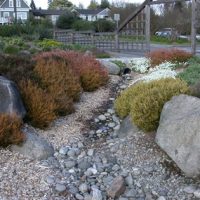What to do with fallen leaves? Arborist Chris Watson considers the options
When asked what homeowners should do with leaves falling from trees growing in city gardens, Chris Watson, Washington Park Arboretum Arborist definitively stated, “it depends!” Is the best mulch for a tree its own leaves? Or does that spread disease and pests? Chris Watson gives an expert’s point of view.
Read moreOctober Color Appears at the Washington Park Arboretum (Part II)
1) Euonymus hamiltonianus subsp. sieboldiana (Siebold’s Euonymus)
Native to the eastern Himalaya 1
Ornamental seed pods on display in autumn months 2
Specimen located in the Spindle Tree Collection
2) Illicium henryi (Henry Anise Tree)
Native to western China 1
Red summer flowers turn to star-shaped fruits in autumn
Specimen located along Upper Trail near the Asiatic Maple Collection
3) Lithocarpus henryi (Longleaf Chinquapin)
Native to central China 1
Notable for “laurel-like, narrow, glossy leaves” 2
Specimen located along the Lower Trail near the Sino-Himalayan Hillside
4) Osmanthus yunnanensis (Chinese Osmanthus)
Native to southern China 1
“Less cold-hardy” than other Osmanthus species in Seattle 2
Specimen located in the Sino-Himalayan Hillside
5) Polyspora kwangsiensis (Fried Egg Plant)
Relative of the Camellia and Stewartia 1
Camellia-like flowers appear in autumn 1
Specimen located along Upper Trail near the Camellia Collection
1 Bean, W.
Autumn Is Amazing
The Liquidambar styraciflua, or Sweetgum, is one of autumn’s most brilliantly colored trees. See it in full glory at the Arboretum.
Read moreKay Chai: UW Farm Alumni Profile

Here at the UW Farm, we are very invested in building a strong community with the participants of the Farm. This community doesn’t stop after you graduate. We love checking in with students who have graduated to see what they’re up to now. Once a month, we will be posting profiles of UW Farm alumni.
Name: Kay Chai
Graduation Class: 2014
Major in Psychology (B.S)
Minor in Philosophy
How were you involved with the Farm?
Read moreOctober Color Appears at the Washington Park Arboretum
1) Franklinia alatamaha
Native to the Alatamaha River, Georgia, and discovered in the late 18th.
Genus contains just one species, and has long been extinct in the wild. Today’s plants all descend, it is believed, from those cultivated in Philadelphia under the name chosen by William Bartram in honor of Benjamin Franklin.
October 2014 Plant Profile: Amaryllis belladonna
When most people think of Amaryllis, the holiday season come to mind. However, true Amaryllis is hardy and one of the few plants to flower in autumn.
Read moreFarm to Table Dinner
Come eat with us! We are gearing up for for dinner on October 23, and you’re invited! Round up your friends and family for a fun-filled evening at the farm, located at the Center for Urban Horticulture. There will be games, pumpkin carving, a food preservation demo and, of course, food!
You’ll be treated to a knockout meal, incorporating UW Farm produce, from the chefs at Chaco Canyon Café.
Annual United Way “Day of Caring” made a huge impact at the Washington Park Arboretum
Over 100 volunteers teamed up on September 19th on six projects that included spreading 218 yards of mulch, salvaging 150 sword ferns and grubbing out truckloads of invasive blackberry. Thank you to every one involved in the Day of Caring!
2014 United Way Day of Caring Debrief
Sept 19, 2014 9a-1p
Participating partners:
Arboretum Foundation – volunteer recruitment and organizer
UW Botanic Gardens – project management (5 projects), equipment and supplies
Seattle Parks and Recreation (1 project), equipment and supplies
UWBG Projects Details:
Pacific Connections Garden-New Zealand Forest
Led by Kathleen DeMaria and Annie Bilotta
80 yards of mulch spread.
A glimpse into the past – Lookout rockery renovations
One of the most interesting rockeries in the Washington Park Arboretum is located just below and north of the now restored Lookout.
Read more